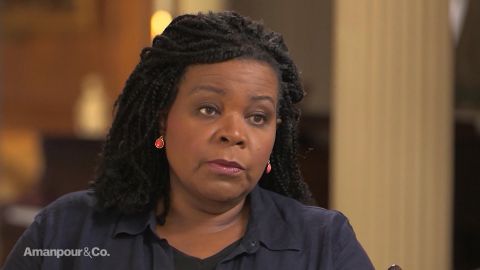Read Transcript EXPAND
CHRISTIANE AMANPOUR: A very bright star indeed. We turn now to American [13:40:00] politics. It is hard to imagine that the country today is what the founding fathers envisioned, whether the toxic rhetoric in politics, the racial tensions or the systemic abuse of women who are finally saying enough. As the nation still searches for a path towards unity, our Walter Isaacson sat down with Pulitzer-Prize winning historian and the renowned legal scholar Annette Gordon-Reed. She argues turning to history’s great leaders is the best way to understand what she calls the American dilemma.
WALTER ISAACSON, CONTRIBUTOR: Professor, thank you for joining us.
ANNETTE GORDON-REED: Very happy to be here.
ISAACSON: We are going to a really divisive period, probably as bad as some parts of the ’60s with the Civil Rights Movement, Vietnam or McCarthyism. What role does history tell us about things that ripple to our time and causes divided sensibilities we have?
GORDON-REED: Well, anytime you have a diverse country with lots of different voices, with people having a different understanding about the direction the country should take it, you’re going to have this kind of fighting, the 1790s. In 1790s, Jefferson and Hamilton sort of set the sort of basic contours of a discussion about what kind of country this is going to be. Very very tough times and we’re seeing this kind of thing again.
ISAACSON: But the contours that they set, the creed that they wrote was out of many one, E Pluribus Unum —
GORDON-REED: Yes.
ISAACSON: — the notion that we had a creed, not just one race or one nationality of people. Are we losing that sense now?
GORDON-REED: Well, I would remind you that at the time that they wrote that creed, a good number of people were enslaved, half the population could not vote. That is to say, women, other people who were not propertied had difficulty as well. So the struggle in America has been trying to bring everybody together to sort of realize that creed. So we’re not — we haven’t been moving away from it. We’ve been steadily moving toward it. Right now, we’re at a point where we’re thinking are we going to continue in that direction. Is the progress going to continue? And I think that’s a real, real point of contention at this point.
ISAACSON: You talk about America’s creed and you’ve mentioned that it wasn’t fully there for everybody including Thomas Jefferson who may have written a lot about — wrote the creed but didn’t walk the walk. You were able to put Sally Hemings, his mistress. Is that a proper word for it in context?
GORDON-REED: Well, people go back and forth on that question. People use concubines. Some people say rape victims. Some people say mistress. Whatever it is, it was something that went on for 38 years. This is a person who’s a significant part of his life and you can’t write about him without thinking about that certainly.
ISAACSON: And you certainly, you know, written about Jefferson and Hemings in two or three books now. And you say that she was a slave but you’re also saying in your work and just now that she also had some agency. In other words, she was in charge of herself a little bit, not just a pure slave, it was more complex.
GORDON-REED: It’s more complicated when they were in France because when she was in France with him, he was serving as the Minister to France. She had the opportunity to be a free person. And she, upon Jeff — after Jefferson’s promises, decided to return to Monticello and live with him. So it wasn’t like a situation that most African-American women in the United States faced where they had no law. The law was on her side. And law made her an enslaved person in Virginia but law gave her an opportunity to be a free person in France. And she decided to come back to Monticello with Jefferson. And once she gets here, of course, she’s in his control and, you know, that’s that.
ISAACSON: One of the wonderful things about your book is you talk about what is really a negotiation that they have in Paris where she’s strong enough to say, “OK, I might come back with you but here’s what I want.” Why did she trust him? And how was that a real negotiation?
GORDON-REED: She was his wife and this is the complicated part of this, wife’s half-sister. And he treated her and her siblings in a different way. And we can see through that, you know, in hindsight–
ISAACSON: The wife had died.
GORDON-REED: His wife had died.
ISAACSON: And she had had a half-sister by her father but a black slave.
GORDON-REED: Yes.
ISAACSON: That’s become Sally Hemings.
GORDON-REED: Sally Hemings’ father was Jefferson’s wife’s father, a man named John Wales who was an Englishman. And she had seen him treat her family in a different way. And as I’m writing this and thinking about this, my inclination is to construct a master enemy and so you don’t trust him. But she knew him and she knew him in a particular context and she thought he said he was going to do what he said and eventually he does. But it was a huge — I’m sitting here writing this and just thinking about this, this is crazy. This is a huge risk you’re taking.
ISAACSON: Part of the negotiation was to make sure that their children — her children would be free.
GORDON-REED: Yes.
ISAACSON: And that includes Madison.
GORDON-REED: Yes.
ISAACSON: I mean she was a really interesting character and you used his writings to help you understand.
GORDON-REED: Yes. Madison Hemings gave his recollections in 1873. He was living in Ohio at the time and he talked about life at Monticello and that Jefferson was his father and Sally Hemings was his mother. And it’s a very matter of fact kind of story. You know you’re listening to him talk and he’s talking about I got married and I worked here, there. And you’re saying tell us more about your mother and your father but he’s just telling his life story. So it’s — that’s just a part of the whole thing. It’s not anything he’s trying to prove, no argument he’s making and he describes what could only be considered the way he talks about his mother and father. He calls them mother and father as a form of family. And again, you sort of recoil it with that because we have an understanding of what family is.
ISAACSON: It involves some equality.
GORDON-REED: Yes, equality, some notions of equality. But you know he talks about father and my mother and mother took care of father’s rooms. It was her duty all of her life to look after his rooms and his wardrobe and look after us children. And that’s what she did for the rest of her life. So it’s a strange kind of story and you think about how this is probably what he did play out all across the south, you know, their household. This was not — it’s a mistake that people I think historians who looked at this first made was sort of writing about this as if this were some rare circumstance and it wasn’t. It wasn’t. You had these kinds of situations and you have in every kind of slave society that’s existed. And it’s difficult for us to see how people negotiated that but they did.
ISAACSON: The wonderful thing about history that you do is remind us it’s always a bit more complex.
GORDON-REED: Absolutely.
ISAACSON: And in this case, it’s complex because Jefferson keeps his promises, treats Madison some ways as a son, although he’s a somewhat —
GORDON-REED: A distant father. A distant father.
ISAACSON: Yes. But he doesn’t free the other slaves. The other slaves at Monticello just have to remain slaves.
GORDON-REED: Yes, yes. The only people he frees in his lifetime are members of the Hemings family, his own children or their uncles.
ISAACSON: And you’ve been involved recently in Monticello in helping them tell the story in a more historically complex way.
GORDON-REED: Yes, yes. To tell the story at all actually. I mean the first time I went to Monticello, 1994 when I was working on my first book. I don’t recall any discussion about Sally Hemings. There were some discussions about slavery but since that time, the place has really opened up and making it a place where you discuss not only Jefferson. Jefferson was a great man and a person who contributed a lot to the United States. And so you have to talk about him, it’s his home. But you also have to talk about the other people who lived there. Jefferson, when he’s on the mountain, would be there with 200 African-American people who were enslaved and a tiny number of white working men. So the story of Monticello is him definitely but it’s all these other people as well.
ISAACSON: You say Jefferson was a great man. If we were to look outside and there was a monument to Jefferson, would you be in favor of taking them down?
GORDON-REED: Of Jefferson? No, because I think Jefferson is too much an integral part of the United States. I understand the idea of taking down the monuments of other people. I think this has to be done on a case by case basis. But you begin to lie to yourself in some way if you take out people who were integral to the nation’s founding and who also have ideas or had ideas that we still revere. The declaration — the words of the declaration are important and we’ve used that to be a part as we’ve said before as an American creed. I don’t see how you remove him from that. What you do is you talk about his life in a real way. You talk about the good points, the bad points, and the contention we have. And he’s perfect in a lot of ways because he embodies the American dilemma. You can talk about race, slavery, politics, gender, all of those things through this man, good things and bad things. And I can’t think of anybody else that fits that bill.
ISAACSON: You were someone who connected to Charlottesville in some ways throughout your career. The white supremacists in Charlottesville, they marched towards George Jefferson statue. What was the significance of that?
GORDON-REED: Well, the significance is that in the only book he ever wrote notes in the State of Virginia, Jefferson talks about the possibility or the impossibility of blacks and whites living together without turmoil, without fighting. And his solution was separation. Slaves should be emancipated but blacks should have their own country. And at first, he thought maybe it was out west, he thought maybe it was in Africa. But he did not think that blacks and whites could live together in harmony because whites would never give up their prejudices and black people would never forgive white people for what they had done. He said, “How could you love a country that had treated you the way blacks have been treated in the United States?” So we typically think of Jefferson as optimistic but in that area, he was not optimistic. He didn’t see how we could live together. And the people marching towards the statue, I think, were doing so as a way of claiming him for that kind of idea, that there were people surrounding the statue who whether they like Jefferson or not were standing for the other ideals of Jefferson. The ideals of the declaration actually, the notion of all men are created equal pursuit of happiness, the American creed. So you had this clash, the American clash, that we’ve had from the very very beginning, are we one people embodied in that particular moment?
ISAACSON: How do we think through now the resonance of what happened in Charlottesville?
GORDON-REED: Well, it’s really tough. I mean I wrote something about this afterwards. And trying to think of how we can come together on this question, on the question of the values of say a Jefferson, the values of the declaration and how we keep those things alive in the face of people who want a country of blood and soil which we have not been and we can’t have been. You’re kidding ourselves if we think that that’s the case. We’re not old enough for that. We don’t have an ancient religion or an established religion. There are people of all different creeds and colors here. And the only thing I think we can do is to talk about these kinds of issues and to confront them and realize that if you don’t talk about or confront, well, evil, the people who were trying to divide us, you can easily slide into something that we don’t — where we don’t want to go. I mean we can’t take for granted that American exceptionalism is going to save us if we don’t really stand up to a lot of the values or against values that we, you know, that are anathema to what the country has stood for.
ISAACSON: You’re talking about blood and soil. Explain the historic resonance of that phrase and how that sort of —
GORDON-REED: Well, the notion that there’s the people. I mean the certainly the Nazis and people in other countries have sort of used the idea of the country and genetics and blood and your attachment to land as a claim that you’ve been in the place for a thousand years. And so all of this mythical in a lot of ways because people have been moving over all along. And the United States is supposed to be a country that’s based upon ideals. If you come here and you accept the values of the American Constitution, of the declaration that is sort of the spirit of all of that, then you can be an American. You pay your taxes and you do, you know, good to your neighbors, and you do those kinds of things that that’s what makes you an American, not your genetics, not your blood, not attachment to a thousand- year attachment to a particular parcel of land or a place. And that’s what makes us different and that’s the thing that we sort of celebrated all of these years and the thing that right now people are questioning. People may have — maybe envy places that attach themselves or have some notion of blood and soil but that’s never who we’ve been.
ISAACSON: Thank you for being with us.
GORDON-REED: Glad to be here.
About This Episode EXPAND
Christiane Amanpour speaks with Mairead McGuinness about Brexit; and Margot Robbie about her role as Elizabeth I in “Mary Queen of Scots.” Walter Isaacson speaks with Annette Gordon-Reed about what she calls “the American dilemma.”
LEARN MORE


